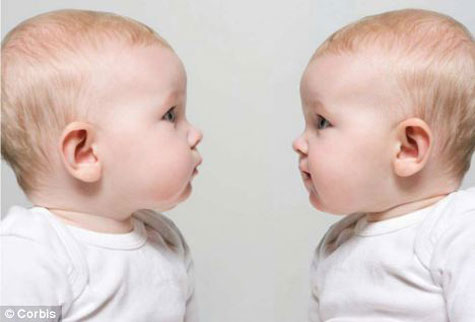Twin: Should be happy or sad?
There are many myths about the health, personality and behavior of twins. How do physicians and psychologists explain these myths?
Twins are always an unusual phenomenon. In the past, people thought that it was the will of the devil. But parents argue that twins are a double joy. There are many myths about the health, personality and behavior of twins. How do physicians and psychologists explain these myths?

There are many different " myths " about twins. (Photo: Corbis).
Myth 1: Twins have genetic causes and usually each generation is repeated once.
This is true because twins have a premise that is hereditary. There are also families that only give birth to twins once and this never happens again. Sometimes twins happen again in the next generation. Twins with the same eggs are rarely repeated.
Myth 2: Twins have the same genome and chromosome.
There are two types of twins. Other twins (two eggs with the same loss and combined with 2 sperm, to simultaneously become embryos, also called bisexual twins), the two identical twins are of the same degree as other siblings. And twins with eggs (fertilized eggs turn into embryos again into two), two twins have the same genetic code. However, their fingerprints are still different.
Myth 3: Twins are always born early.
Not necessarily. But often so. On average, twins are born after 40 weeks. According to experienced obstetricians, the gestational period of twins is 37 weeks.
Myth 4: When the mother is pregnant, she should only have surgery.
In fact, the caesarean section rates are the same in both singleton and fetal cases. The story of caesarean section should only be mentioned in triplets or private life because these cases are naturally high risk. Any normal woman is healthy enough to have two consecutive children.
Myth 5: Children with single-zygote twins (same eggs) are so similar that they cannot be distinguished.
If you look closely, find different points. A mole for example and many other things. Can be distinguished by smiles, voices, facial expressions .
Myth 6: Young twins often differ in personality. For example, if this child is miserable, will the other be lively?
Not necessarily. The similarities or differences are just like normal siblings. But there is the fact that they do not want to be considered by everyone and always want to confirm their ' independence '.
Myth 7: Usually in two twins, the older one (the previous generation) always commands, the small one just imitates, follows.
This depends on the parent's education. If parents tell the child who is he (or sister), he will try to have an appropriate behavior with his ' status '. Confucius has another basis to determine who is a brother and sister. Being born just a few minutes apart doesn't mean anything.

Myth 8: When growing up, it's best not to let them go to the same class.
Many parents also try to separate twins from different classes or in the same class so they don't sit side by side. However, in order to make things easier for me, the teachers do not want to mess up. Actually, when they were small, they lived together like a picture with a shadow, separating them can make them stressful and not necessarily beneficial.
Child psychologists think that when they first go to school, they should be put into the same class. Later, when they are large, independent, let them choose the same or different layers.
Myth 9: Twins have a special hunch to ' communicate ' with each other when away from each other.
In principle, those close to each other, living together for a long time often " sympathize " with each other's thoughts: husband and wife, parents with children, siblings. Siblings living together are closer and closer, so the feeling of each other is even deeper. One of the two children who are separated from each other can 'feel' the other's risk, injury, sickness .), sometimes they can read each other's thoughts. Don't be surprised when they think the same. However, if from a young age, they are nurtured apart, they do not observe this phenomenon.
- Scientific aspect of happy relationship
- Kangaroo is a rare twin in Australia
- The twin twin stars are very different
- The world's tallest twin tower helps clean the air
- Do you know what happy cells look like?
- The United States appears rare twin manatees
- Simple principles help you to have a happy life
- NASA's twin astronaut experiment
- Mysterious conversation of 18-month-old twins
- Hypothesis of the lost brother of the Sun.
- The Sun's search for a twin brother
- Chimpanzees and orangutans also have a U-shaped happy chart
 Green tea cleans teeth better than mouthwash?
Green tea cleans teeth better than mouthwash? Death kiss: This is why you should not let anyone kiss your baby's lips
Death kiss: This is why you should not let anyone kiss your baby's lips What is salmonellosis?
What is salmonellosis? Caution should be exercised when using aloe vera through eating and drinking
Caution should be exercised when using aloe vera through eating and drinking